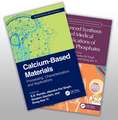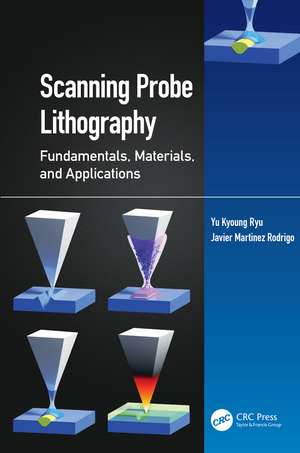Scanning Probe Lithography: Fundamentals, Materials, and Applications: Emerging Materials and Technologies
Autor Yu Kyoung Ryu, Javier Martinez Rodrigoen Limba Engleză Hardback – 22 dec 2022
• Introduces historical background of SPL, including evolution of the technique and tools
• Explains the mechanism of sample modification/manipulation, types of AFM tips, technical parts of the experimental setup, and materials on which the technique can be applied
• Shows the different types of devices and structures fabricated by SPL, together with the processing steps
• Contains a complete and state-of-the art package of examples and different approaches, performed by different international research groups
• Summarizes strengths, limitations, and potential of SPL
This book is aimed at advanced students, technicians, and researchers in materials science, microelectronics, and others working with lithographic techniques and fabrication processes.
Din seria Emerging Materials and Technologies
- 9%
 Preț: 763.94 lei
Preț: 763.94 lei -
 Preț: 377.23 lei
Preț: 377.23 lei -
 Preț: 358.41 lei
Preț: 358.41 lei - 9%
 Preț: 766.45 lei
Preț: 766.45 lei - 9%
 Preț: 639.75 lei
Preț: 639.75 lei -
 Preț: 381.33 lei
Preț: 381.33 lei - 9%
 Preț: 641.14 lei
Preț: 641.14 lei - 9%
 Preț: 693.79 lei
Preț: 693.79 lei - 9%
 Preț: 763.91 lei
Preț: 763.91 lei - 9%
 Preț: 937.19 lei
Preț: 937.19 lei - 9%
 Preț: 728.67 lei
Preț: 728.67 lei - 9%
 Preț: 1727.63 lei
Preț: 1727.63 lei - 9%
 Preț: 832.36 lei
Preț: 832.36 lei - 9%
 Preț: 696.28 lei
Preț: 696.28 lei - 18%
 Preț: 1119.75 lei
Preț: 1119.75 lei - 18%
 Preț: 782.74 lei
Preț: 782.74 lei - 18%
 Preț: 1000.27 lei
Preț: 1000.27 lei - 18%
 Preț: 1004.20 lei
Preț: 1004.20 lei - 18%
 Preț: 903.67 lei
Preț: 903.67 lei - 18%
 Preț: 1120.55 lei
Preț: 1120.55 lei - 18%
 Preț: 902.42 lei
Preț: 902.42 lei - 25%
 Preț: 710.83 lei
Preț: 710.83 lei - 18%
 Preț: 896.13 lei
Preț: 896.13 lei - 18%
 Preț: 1061.22 lei
Preț: 1061.22 lei - 18%
 Preț: 779.13 lei
Preț: 779.13 lei - 18%
 Preț: 895.46 lei
Preț: 895.46 lei - 18%
 Preț: 781.28 lei
Preț: 781.28 lei - 15%
 Preț: 697.85 lei
Preț: 697.85 lei - 28%
 Preț: 717.31 lei
Preț: 717.31 lei - 18%
 Preț: 909.01 lei
Preț: 909.01 lei - 9%
 Preț: 1009.04 lei
Preț: 1009.04 lei - 18%
 Preț: 782.44 lei
Preț: 782.44 lei - 18%
 Preț: 1000.89 lei
Preț: 1000.89 lei - 18%
 Preț: 1058.34 lei
Preț: 1058.34 lei - 18%
 Preț: 1062.62 lei
Preț: 1062.62 lei - 18%
 Preț: 836.77 lei
Preț: 836.77 lei - 18%
 Preț: 897.70 lei
Preț: 897.70 lei - 20%
 Preț: 886.55 lei
Preț: 886.55 lei - 9%
 Preț: 937.14 lei
Preț: 937.14 lei - 18%
 Preț: 844.97 lei
Preț: 844.97 lei - 18%
 Preț: 1059.14 lei
Preț: 1059.14 lei - 15%
 Preț: 566.19 lei
Preț: 566.19 lei - 18%
 Preț: 887.43 lei
Preț: 887.43 lei - 18%
 Preț: 892.48 lei
Preț: 892.48 lei - 18%
 Preț: 890.59 lei
Preț: 890.59 lei - 18%
 Preț: 838.18 lei
Preț: 838.18 lei - 18%
 Preț: 1057.26 lei
Preț: 1057.26 lei - 9%
 Preț: 1075.57 lei
Preț: 1075.57 lei
Preț: 522.74 lei
Preț vechi: 702.11 lei
-26% Nou
Puncte Express: 784
Preț estimativ în valută:
100.03€ • 106.96$ • 83.40£
100.03€ • 106.96$ • 83.40£
Carte tipărită la comandă
Livrare economică 17 aprilie-01 mai
Preluare comenzi: 021 569.72.76
Specificații
ISBN-13: 9781032122144
ISBN-10: 1032122145
Pagini: 144
Ilustrații: 17 Line drawings, black and white; 43 Halftones, black and white; 60 Illustrations, black and white
Dimensiuni: 156 x 234 x 14 mm
Greutate: 0.34 kg
Ediția:1
Editura: CRC Press
Colecția CRC Press
Seria Emerging Materials and Technologies
ISBN-10: 1032122145
Pagini: 144
Ilustrații: 17 Line drawings, black and white; 43 Halftones, black and white; 60 Illustrations, black and white
Dimensiuni: 156 x 234 x 14 mm
Greutate: 0.34 kg
Ediția:1
Editura: CRC Press
Colecția CRC Press
Seria Emerging Materials and Technologies
Notă biografică
Dr. Yu Kyoung Ryu is a postdoctoral researcher at Instituto de Sistemas Optoelectrónicos y Microtecnología (Universidad Politécnica de Madrid). She received a Physics degree from Universidad Complutense de Madrid and PhD from Instituto de Ciencia de Materiales de Madrid (ICMM, CSIC), under the supervision of Prof. Ricardo Garcia. She did a postdoctoral stay at IBM Research Zurich in the group of Dr. Armin Knoll (2016–2017) and a postdoctoral stay at ICMM (CSIC) in the group of Dr. Andrés Castellanos-Gomez (2019–2020). She has published 21 peer-reviewed articles in international journals (including ACS Nano, Nano Letters, Physical Review Letters, 2D Materials) and 3 book chapters.
Prof. Javier Martinez Rodrigo is Vice Principal of the Instituto de Sistemas Optoelectrónicos y Microtecnología (ISOM) at Universidad Politécnica de Madrid (UPM) and coordinator of the ICTS Clean Rooms network for Micro and Nanofabrication MICRONANOFABs (www.micronanofabs.org). He achieved the PhD degree in Physics in 2002 and also an Electronic Engineering degree from Universidad de Valladolid. He worked as postdoctoral researcher at the Lawrence Berkeley National Laboratory (USA) in 2003 and later he was appointed as CSIC researcher at the Madrid Institute of Microelectronics, where his main topic was the fabrication of devices and the development of high-throughput strategies based on oxidation scanning probe lithography. In 2011 he became I3 Professor at UPM. His research interest is focused in the development of nanoelectronic devices fabricated with graphene or other 2D materials for energy applications. He has published more than 30 peer-reviewed articles in international journals (including Nature Nanotechnology, Advanced Materials, Nano Letters) and 1 book chapter. He holds 2 patents.
Prof. Javier Martinez Rodrigo is Vice Principal of the Instituto de Sistemas Optoelectrónicos y Microtecnología (ISOM) at Universidad Politécnica de Madrid (UPM) and coordinator of the ICTS Clean Rooms network for Micro and Nanofabrication MICRONANOFABs (www.micronanofabs.org). He achieved the PhD degree in Physics in 2002 and also an Electronic Engineering degree from Universidad de Valladolid. He worked as postdoctoral researcher at the Lawrence Berkeley National Laboratory (USA) in 2003 and later he was appointed as CSIC researcher at the Madrid Institute of Microelectronics, where his main topic was the fabrication of devices and the development of high-throughput strategies based on oxidation scanning probe lithography. In 2011 he became I3 Professor at UPM. His research interest is focused in the development of nanoelectronic devices fabricated with graphene or other 2D materials for energy applications. He has published more than 30 peer-reviewed articles in international journals (including Nature Nanotechnology, Advanced Materials, Nano Letters) and 1 book chapter. He holds 2 patents.
Cuprins
1. Historical Background and Positioning in the Lithography Roadmap. 2. Basic Concepts and Modalities. 3. Mechanical Scanning Probe Lithography. 4. Dip Pen Nanolithography. 5. Field Emission Scanning Probe Lithography. 6. Oxidation Scanning Probe Lithography. 7. Thermal Scanning Probe Lithography. 8. Lithography Using an Scanning Tunneling Microscope. 9. High Throughput Strategies.
Descriere
This work details the modalities, mechanisms, technologies, applications, and materials on which Scanning Probe Lithography can be performed. It provides an overview of this simple and cost-effective technique, which can be performed in any lab or facility to achieve high-resolution and high-quality patterns on a wide range of 2D materials.
